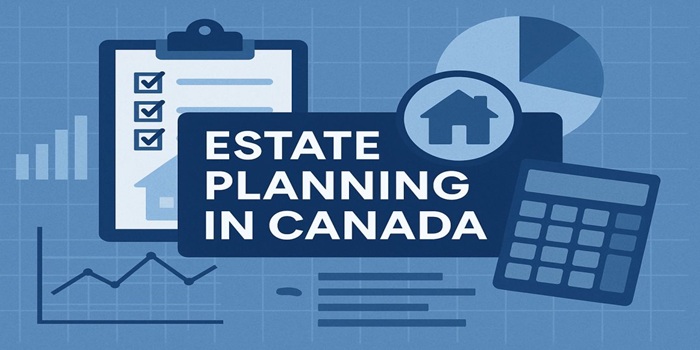
Estate planning is a vital step to ensure your assets are managed and distributed according to your wishes after your death. Many Canadians underestimate its importance or confuse it with simply having a will. At SRJ Chartered Professional Accountants, we emphasize the value of comprehensive estate planning to protect your family, minimize taxes, and avoid legal complications. This article serves as a complete guide to estate planning in Canada, including what it involves, why it matters, and a practical checklist to help you prepare.
What Is Estate Planning?
At its core, estate planning is the process of organizing your financial and legal affairs to manage your assets during your lifetime and after death. This includes deciding how your property, investments, and personal belongings will be distributed, who will make decisions if you become incapacitated, and how taxes and debts will be handled.
Many people think estate planning simply means drafting a will, but it is much broader. It can involve creating trusts, setting up powers of attorney, naming guardians for minor children, and establishing tax strategies. A well-crafted estate plan gives you control over your legacy and peace of mind knowing your loved ones will be cared for.
In Canada, estate planning also addresses the legal and tax implications that arise when someone passes away. Understanding how these factors interact can help you avoid delays, family disputes, and costly taxes.
Why Is Estate Planning Important in Canada?
Canada’s legal and tax system has specific rules governing what happens to your assets after death. While there is no federal inheritance tax, there are tax implications such as capital gains tax triggered on the deemed disposition of assets at death. Without a clear plan, your estate could face probate fees, taxes, and administrative delays.
Moreover, if you die without a will—a situation known as dying intestate—provincial laws determine how your estate is divided. This may not align with your wishes and can lead to unnecessary conflict among heirs.
SRJ Chartered Professional Accountants advises every Canadian to take estate planning seriously, regardless of the size of their estate. A good estate plan protects your family, ensures your wishes are respected, and can significantly reduce the financial burden on your heirs.
Key Components of Estate Planning in Canada
- The Will
The cornerstone of any estate plan is the will. A will is a legal document that specifies how you want your assets distributed, appoints an executor to manage your estate, and can designate guardians for minor children. Without a valid will, provincial laws dictate asset distribution, which may not reflect your desires.
However, a will alone is often not enough for comprehensive estate planning. - Trusts
Trusts are legal arrangements where a trustee holds and manages assets on behalf of beneficiaries. Trusts can offer more control over how and when your assets are distributed, protect assets from creditors, and provide tax planning benefits. They are particularly useful for families with minor children, beneficiaries with special needs, or complex estates. - Powers of Attorney
These legal documents allow you to appoint someone to make financial or health decisions if you become unable to do so yourself. There are two main types: one for property (financial affairs) and one for personal care (health and living arrangements). - Beneficiary Designations
Many registered accounts like RRSPs, RRIFs, and insurance policies allow you to name beneficiaries directly. These designations override instructions in your will, so keeping them updated is crucial to ensure assets go to the intended individuals. - Tax Planning
While Canada does not have an estate tax per se, your estate will likely face taxes on capital gains, income, and other assets. Estate planning includes strategies to minimize these taxes, such as using spousal rollovers, gifting assets during your lifetime, or employing trusts.
Estate Planning Canada Checklist

To help Canadians take control of their estate planning, here’s a detailed checklist based on the best practices recommended by financial experts:
- Create or update your will
Review your will regularly to reflect changes in family dynamics, finances, and personal wishes. - Choose an executor
Select a responsible person you trust to manage your estate. Discuss this role with them in advance. - Name guardians for minor children
If applicable, clearly appoint guardians to care for your children if you are unable. - Establish powers of attorney
Set up powers of attorney for property and personal care to ensure decisions can be made on your behalf if needed. - Review and update beneficiary designations
Confirm that registered accounts and insurance policies have current beneficiary information. - Consider trusts
Determine if a trust is beneficial for your situation to control distributions or protect assets. - Inventory your assets and debts
Compile a comprehensive list to provide clarity for your executor and heirs. - Plan for taxes
Consult a tax professional to understand and plan for taxes due at death. - Communicate your plan
Inform trusted family members or advisors where to find your documents and your intentions. - Store documents securely
Keep originals in a safe place and provide copies to relevant parties.
Common FAQ’s About Estate Planning in Canada
What should be included in an estate plan?
An estate plan generally includes a valid will, powers of attorney, beneficiary designations, and any trusts. It also considers tax strategies and guardianship arrangements if you have children. Together, these elements ensure your assets and decisions are handled according to your wishes.
Is a will enough for estate planning in Canada?
While a will is undoubtedly a fundamental and essential document in estate planning, relying on a will alone may not be sufficient for everyone, especially those with more complex financial situations or specific goals. A will primarily governs the distribution of your assets after death, but it does not address issues like managing your affairs if you become incapacitated, tax planning, or protecting assets from potential creditors or beneficiaries who may not be ready to manage their inheritance.
Therefore, additional estate planning tools such as trusts, powers of attorney, and beneficiary designations are often necessary. Trusts can help manage how and when your assets are distributed and offer potential tax advantages. Powers of attorney ensure someone you trust can make financial and healthcare decisions on your behalf if you are unable. Together, these instruments provide greater flexibility and security beyond what a will alone can offer.
How much does estate planning cost in Canada?
The cost of estate planning in Canada can vary widely depending on several factors, including the complexity of your estate, the legal and financial instruments involved, and the professionals you engage to assist you. For straightforward situations, creating a simple will might cost a few hundred dollars, especially if you use standard templates or online services. However, more comprehensive estate planning—such as establishing trusts, powers of attorney, and tax-efficient strategies—typically involves fees that can run into the thousands of dollars.
Engaging experienced professionals like accountants and estate lawyers often requires a higher upfront investment, but this can result in significant savings over time by minimizing tax burdens, avoiding legal disputes, and ensuring your estate is administered smoothly. Ultimately, investing in proper estate planning with expert guidance is a cost-effective way to protect your assets and provide peace of mind for you and your family.
What is the difference between a will and a trust in Canada?
A will takes effect after death and directs asset distribution. A trust is a legal entity that can hold and manage assets during your lifetime and after death, providing more control over how and when beneficiaries receive assets. Trusts can also offer tax advantages and protection from creditors.
SRJ Chartered Professional Accountants
Estate planning is not just for the wealthy—it is a critical step for anyone who wants to protect their family and legacy. At SRJ Chartered Professional Accountants, we understand that Canada estate planning involves both legal and financial components, requiring careful coordination. Our team works closely with you to create tailored solutions that reflect your goals, minimize taxes, and provide peace of mind.
By following this guide and checklist, you can take meaningful steps toward a secure future for you and your loved ones. Contact SRJ Chartered Professional Accountants today to start your estate planning journey with expert support.